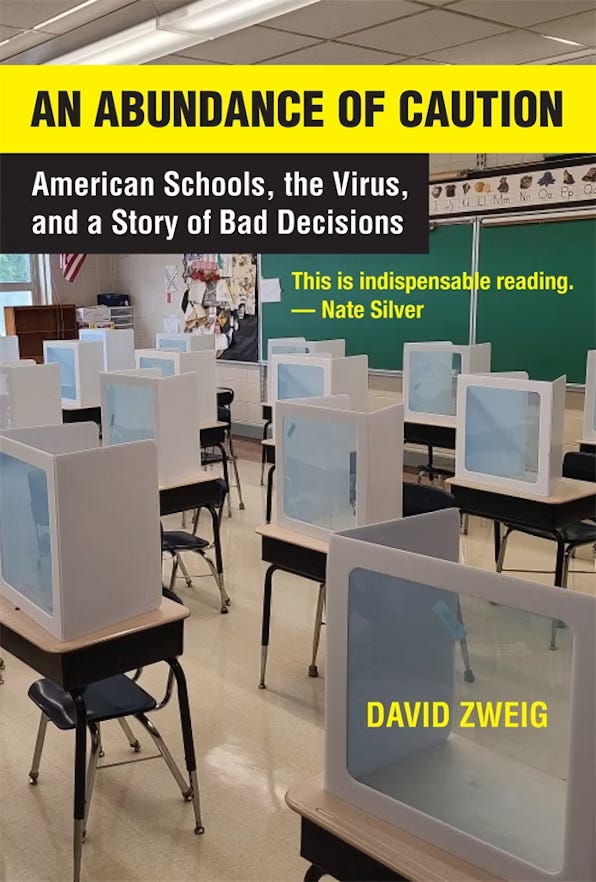The Era of Epistemic Crime
the science was a manipulation of a projection of an estimate of a guess of a shrug of a blindfolded dart game of a shot in the dark, but you better trust the experts or else
We lived through a long period of fakery and rhetorical inflation, much of which faded into the background without actually dying out. You know that, instinctively, but one of our best journalists has just given us the details — in a way that calls into question our ability to discern reality through the veil of ongoing politicization and manufactured panic in every arena.
Despite that, David Zweig’s extraordinary new book on the pandemic isn’t catching fire. At Amazon, it’s hovering around #13,000 on the sales list.
I wrote a book that hovered around #13,000 on the sales list in the weeks after release, and I feel this in my bones. The implication is that the definitive book on the recent and massive failures of experts, policymakers, and journalists is being aggressively ignored by a good number of experts, policymakers, and journalists. But I’m going to say this again: You need to read this important book, which you can order directly from the publisher here. Policymakers and legacy media journalists should also be reading it, all of them, and doing so in sackcloth and ashes, but they clearly aren’t.
The publisher is underselling the story: It’s not just a book about the bad decision to close schools. It’s a deeply reported story about unmerited certainty, corrupted science, the inevitable disaster of argument from misguided authority, and hypercredulous, authority-focused journalism. It’s about policy built on a rotten foundation. With perfect timing, the former biology professor Brett Weinstein has just offered these thoughts (click the link to play the video):
“They are sabotaging all of the mechanisms that we would normally use to figure out what is true...So we are left to make sense of the world without the most obvious basic tools.”
Though it isn’t being marketed this way, that’s what Zweig’s book is ultimately about.
Today I’m going to show you a single very brief example of the work Zweig does to uncover the failures of pandemic-era policymaking. Zweig started his career as a fact-checker for a magazine, and he thinks like a disciplined fact-checker. He wants the evidence, and he wants the evidence for the evidence, and then he wants to know the assumptions and foundations behind the evidence that’s behind the evidence. So he starts, for example, with the foundational work of Robert Glass, “a complex systems modeler,” and his influential work projecting the protective effects of school closures during the pandemic. Infamously, Glass published models that were designed in good part by his 14 year-old daughter as a high school project. But the 14 year-old and her dad built their models on the base of…other models. Zweig, pg. 27:
Zweig does this over and over and over again: Reading footnotes and cited papers, he shows that the science that shaped our lives for a couple of very dark years, the deeply important research that was presented as the expert foundations of the official response to the pandemic, was full of flat-out invention and fakery. In Chapter 5, Zweig compares the accuracy of pandemic modeling efforts by the world’s top public health experts to the casual modeling efforts of hobbyist amateurs in totally unrelated fields. I beg you to go find that part for yourself, and see the verdict in the book.
Zweig’s book looks back, but I keep reading forward. A book about school closures strikes me as a book about green energy and the economic effects of federal spending and the conclusion of the war in Ukraine, and so on. This is a book about evidence. He’s asking what base of information and logic forms our public debates, and the answer is disturbing. Please read this book.







For a look at the way the gatekeepers are responding to Zweig's book, read the aggressively stupid review in the New Yorker:
https://archive.is/uhiXo
I have to be honest. While I'm sure the book is great, this subject just has me so fatigued that I don't care anymore. Every day, it's being revealed that the political and public health leadership over the last few years has been corrupt. I lived through it, so I'm pretty aware of it. Until we start prosecuting people, however, I just don't care. Because most of those public health people are still in positions of power (at least at the state and local level, if not FDA, HHS, and NIAID). I want prosecutions and trials and jail time. I want firings and eliminations of bureaucratic departments. I want... accountability. Until then, none of these "OMG, you won't believe how bad the details are!" books really interest me. Yes, I believe you. It was very bad. Now prosecute somebody.